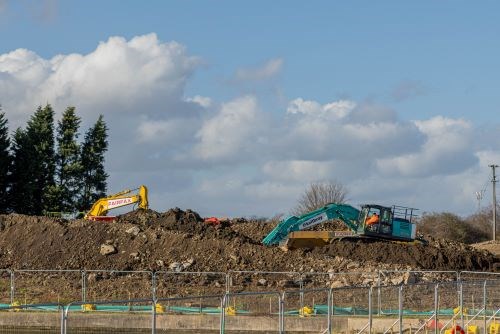“The Procurement Act will tear down barriers that stop small businesses from winning government work, giving them greater opportunity to access the £400 billion spent on public procurement every year, investing in home-grown talent and driving innovation and growth.
Shirley Cooper, Crown Representative for Small Businesses, said: “This change to public procurement laws will provide enormous opportunities for small businesses to take a greater share of contracts. The Act, which goes live alongside our bold new National Procurement Policy Statement, will drive economic growth and deliver on the Government’s Missions and the Plan for Change.”New rules aim got make it easier for SMEs to win Government work
New laws create ‘bonus ban’ for bosses of firms polluting UK rivers
AspinallVerdi moves to new premises at The Calls after strong growth
UK pharmacies warn of financial crisis, may cut hours
The National Pharmacy Association (NPA), representing 6,000 independent pharmacies, warns that rising costs could force its members to take collective action, including reduced operating hours, if the government does not provide additional funding soon.
According to the NPA, pharmacies in England face £250 million in unplanned costs from April due to increases in National Insurance, the National Living Wage, and business rates. Unlike other businesses, pharmacies cannot adjust pricing to offset expenses, as around 90% of their revenue comes from NHS-funded services.
A recent NPA ballot found that 99.7% of participating pharmacies support collective action if funding does not improve. The group says pharmacy closures have already reached record levels, and those remaining are under severe financial strain.
The Department of Health and Social Care stated that it is consulting with Community Pharmacy England on funding and will provide an update when it has the opportunity.
Oncimmune seeks funding as contract delays impact cash flow
Oncimmune Holdings has hired Alvarez & Marsal to help secure additional financing for its trading subsidiary. The Leeds-based precision medicine company cited slower-than-expected contract conversions as a key factor in its need for funding.
The company is also exploring strategic partnerships and business synergies. Despite current financial pressures, Oncimmune stated it remains confident in its long-term prospects. It highlighted ongoing discussions for 11 projects worth over £1.8 million and potential follow-on contracts from existing clients. However, the company acknowledged uncertainty around the timing and value of these deals.
Rotherham Gateway Station bid focuses on regeneration despite weak transport case
Plans for a new mainline railway station at Parkgate in Rotherham are moving forward. To secure funding, supporters are emphasising the project’s economic regeneration potential.
A masterplan has been completed, but local officials acknowledge that current government evaluation criteria show “weak transport benefits” for the integrated mainline station and tram train stop. The project remains under the Department for Transport’s oversight, requiring a business case aligned with Treasury guidelines.
In 2022, the government blocked £8 million in regional transport funding for the station, citing the need for integration with national networks.
Lead developer partner sought to help deliver next stage of Hull’s Albion Square project
Work starts to prepare Doncaster Waterfront for future development
Work has begun to transform an area of Doncaster City Centre into an open space ready to be used for future development.
Arla plans to close North Yorkshire dairy, putting 128 jobs at risk
Arla Foods has announced plans to close its Settle dairy factory by the end of 2026, putting 128 jobs at risk. The company intends to consolidate operations at its Lockerbie site in Scotland, where it plans to invest nearly £90 million and create 90 new jobs. Some production from Stourton, Leeds, will also move to Lockerbie, though no job losses are planned in Leeds.
The GMB union has called the closure a major blow to Settle’s workforce and local economy. Arla has begun a consultation process with employees, stating the move aligns with its strategy to modernise UK dairy production.
Bus company steps in with free service for college after minibus theft
Work begins on new care home in York
Secretary of State pledges to put more money into farmers’ pockets
- Extending the Seasonal Worker visa route for five more years giving farms a pipeline of workers and certainty to grow their businesses
- Requiring government catering contracts to favour high-quality, high-welfare products that local farms and producers can serve, as part of government ambition for at least half the food supplied into the £5 billion public sector catering contracts to be from British producers or those certified to higher environmental standards.
- investing £110m into R&D for agri-technology for farmers, such as chemical-free cleaning for integrated milking equipment, which lowers energy costs and chemical use. The Farming Equipment and Technology Fund provides grants of up to £25,000 to buy new equipment such as electric weeders to reduce chemical use.
- Protecting farmers in trade deals
- Setting up a new National Biosecurity Centre to transform the Animal and Plant Health Agency animal health facility at Weybridge, investing £200 million to improve resilience against animal disease to protect farmers and food producers.
“My focus is on ensuring farming becomes more profitable because that’s how we make your businesses viable for the future. And that’s how we ensure the long-term food security this country needs.”
Lincolnshire district to receive £7.8m for tourism and woodland restoration
East Lindsey District Council has allocated £7.8 million to improve tourism and local infrastructure. The funding of the East Lindsey Investment Fund includes £1.8 million for tourism-related projects, such as road upgrades, car parks, markets, signage, and visitor facilities.
A significant portion of the funding will go to The Woodland Trust to purchase and restore the 483-acre Harrison Woodlands near Louth. The site, currently damaged and closed to the public, will undergo tree removal and regeneration before reopening.
The initiative aims to boost the local economy and strengthen East Lindsey’s position as a key tourist destination, further developing the Lincolnshire Wolds Area of Outstanding Natural Beauty.
ABP begins restoration of historic Grimsby port buildings
Associated British Ports (ABP) has begun structural renovations on historic buildings at the Port of Grimsby as part of a long-term redevelopment plan. The project aims to make the buildings wind and watertight, with roofs, windows, doors, and brickwork repairs.
Surveys, including structural assessments and external mapping, are underway to determine the condition of the properties before interior inspections begin. ABP is working with North East Lincolnshire Council and Historic England to explore future uses for the area, with potential interest from industrial sectors and the film industry.
The renovation is part of a broader heritage regeneration initiative, with a second round of funding recently confirmed.
BCC meets ambassadors from across the EU
- Two fifths (41%) of UK exporters disagree the Brexit deal is helping them grow sales.
- Only 14% of UK exporters think the deal is helping them to grow.
- Almost half (46%) of UK businesses want the Government to make it easier for their staff to work in the EU.
- More than a third (37%) want a reduction in VAT requirements to export to the EU.
- And a quarter (25%) want the UK to align with rules and regulations with the EU in key goods sectors.
Harrogate tech company reaches reseller agreement with Canadian firm
North Yorkshire petrol station with shop and workshop listed for £485,000
Aysgarth Garage, a petrol station in Leyburn, North Yorkshire, has been put up for sale at £485,000. The property includes a filling station, a large convenience store with a Post Office, a spacious car park, and a jet wash.
The site also features a former car showroom with potential for redevelopment, a restoration workshop with space for three cars, and a two-post ramp. The business benefits from a prime location in the Yorkshire Dales National Park, attracting walkers, motorcyclists, and classic car enthusiasts.
The forecourt shop offers food, drinks, household goods, food-to-go options, and a large storage area. Additional facilities include a manager’s office, stock room, boiler room, and workshop. The forecourt has two pump islands, parking for 13 vehicles, and a jet wash bay.
The current owner, who bought the business seven years ago, is selling due to retirement. For the year ending February 2024, the business generated £697,736 in turnover (excluding VAT) and a gross profit of £173,497.
Major banks fined £104m for sharing sensitive bond data
HSBC, Citi, Morgan Stanley, and the Royal Bank of Canada (RBC) will pay a combined £104 million in fines after the UK’s Competition and Markets Authority (CMA) found they had exchanged sensitive information on government bonds. The violations took place between 2009 and 2013 through private Bloomberg chatrooms, where traders from the four banks and Deutsche Bank discussed details related to gilt auctions, asset swaps, and sales to the Bank of England.
Citi will pay £17.16 million, HSBC £23.4 million, Morgan Stanley £29.7 million, and RBC £34.2 million. Each bank received a reduced fine for cooperating with the investigation. Deutsche Bank was granted immunity for reporting the misconduct.
The CMA stated that all banks have since implemented compliance measures to prevent similar breaches. The firms have until April 22, 2025, to pay their fines.
Dacre Son & Hartley acquires long-established rural agency
Thurston Group acquires Storplan to expand modular building capabilities
Thurston Group has acquired fabrication specialist Storplan, expanding its manufacturing capacity and product offerings. The deal gives the Wakefield-based modular building manufacturer access to Storplan’s 20,500 sq ft York facility, allowing it to take on larger structural steel and modular construction projects.
Storplan, founded in 2000, specialises in mezzanine floors, racking, and partitioning for retail and industrial storage. All employees will be retained, and the acquisition is expected to reduce outsourcing, control costs, and improve productivity and quality.
Both companies are owned by HLD Group, which acquired Thurston in 2021. The combined businesses now serve over 100 clients with a turnover exceeding £60 million.






















